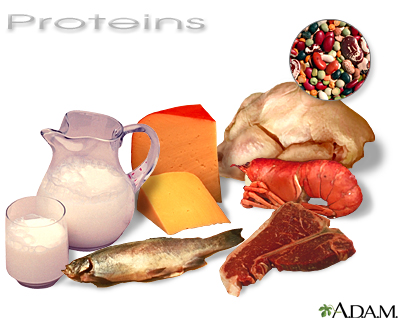Protein in diet
Diet - protein
Proteins are the building blocks of life. Every cell in the human body contains protein. The basic structure of protein is a chain of amino acids.
You need protein in your diet to help your body repair cells and make new ones. Protein is also important for growth and development in children, teens, and pregnant women.
Images

I Would Like to Learn About:
Food Sources
The protein in food is broken down into parts called amino acids during digestion. The human body needs a number of amino acids in large enough amounts to maintain good health.
Amino acids are found in animal sources such as meats, milk, fish, and eggs. They are also found in plant sources such as soy, beans, legumes, nut butters, and some grains (such as wheat germ and quinoa). You do not need to eat animal products to get all the protein you need in your diet.
Amino acids are classified into three groups:
- Essential
- Nonessential
- Conditional
Essential amino acids cannot be made by the body, and must be supplied by food. They do not need to be eaten at every meal. The balance over the whole day is more important.
Nonessential amino acids are made by the body from essential amino acids or in the normal breakdown of proteins.
Conditional amino acids are needed in times of illness and stress.
Recommendations
The amount of protein you need in your diet will depend on your overall calorie needs. The daily recommended intake of protein for healthy adults is 10% to 35% of your total calorie needs. One gram of protein supplies 4 calories. Therefore, a person on a 2000 calorie diet could eat 100 grams of protein, or 400 calories from protein, which would supply 20% of their total daily calories.
One ounce (30 grams) of most protein-rich foods contains 7 grams of protein. An ounce (30 grams) equals:
- 1 oz (30 g) of meat fish or poultry
- 1 large egg
- ¼ cup (60 milliliters) tofu
- ½ cup (65 grams) cooked beans or lentils
Low fat dairy is also a good source of protein.
Whole grains contain more protein than refined or "white" products.
Children and teens may need different amounts, depending on their age. Some healthy sources of animal protein include:
- Turkey or chicken with the skin removed, or bison (also called buffalo meat)
- Lean cuts of beef or pork, such as round, top sirloin, or tenderloin (trim away any visible fat)
- Fish or shellfish
Other good sources of protein include:
- Pinto beans, black beans, kidney beans, lentils, split peas, or garbanzo beans
- Nuts and seeds, including almonds, hazelnuts, mixed nuts, peanuts, peanut butter, sunflower seeds, or walnuts (Nuts are high in fat so be mindful of portion sizes. Eating calories in excess of your needs may lead to weight gain.)
- Tofu, tempeh, and other soy protein products
- Low-fat dairy products
The US Department of Agriculture's newest food guide, called MyPlate, can help you make healthy eating choices.
Related Information
Amino acidsBile
Lipoprotein-a
References
National Academy of Sciences, Institute of Medicine, Food and Nutrition Board. Dietary reference intakes for energy, carbohydrate, fiber, fat, fatty acids, cholesterol, protein, and amino acids. National Academy Press. Washington, DC, 2005. nap.nationalacademies.org/catalog/10490/dietary-reference-intakes-for-energy-carbohydrate-fiber-fat-fatty-acids-cholesterol-protein-and-amino-acids. Updated 2005. Accessed April 21, 2023.
Ramu A, Neild P. Diet and nutrition. In: Naish J, Syndercombe Court D, eds. Medical Sciences. 3rd ed. Philadelphia, PA: Elsevier; 2019:chap 16.
Snetselaar LG, de Jesus JM, DeSilva DM, Stoody EE. Dietary guidelines for Americans, 2020-2025: understanding the scientific process, guidelines, and key recommendations. Nutr Today. 2021;56(6):287-295. PMID: 34987271. pubmed.ncbi.nlm.nih.gov/34987271/.
BACK TO TOPReview Date: 4/13/2023
Reviewed By: Stefania Manetti, RD/N, CDCES, RYT200, My Vita Sana LLC - Nourish and heal through food, San Jose, CA. Review provided by VeriMed Healthcare Network. Also reviewed by David C. Dugdale, MD, Medical Director, Brenda Conaway, Editorial Director, and the A.D.A.M. Editorial team.

Health Content Provider
06/01/2025
|
A.D.A.M., Inc. is accredited by URAC, for Health Content Provider (www.urac.org). URAC's accreditation program is an independent audit to verify that A.D.A.M. follows rigorous standards of quality and accountability. A.D.A.M. is among the first to achieve this important distinction for online health information and services. Learn more about A.D.A.M.'s editorial policy, editorial process and privacy policy. A.D.A.M. is also a founding member of Hi-Ethics. This site complied with the HONcode standard for trustworthy health information from 1995 to 2022, after which HON (Health On the Net, a not-for-profit organization that promoted transparent and reliable health information online) was discontinued. |
The information provided herein should not be used during any medical emergency or for the diagnosis or treatment of any medical condition. A licensed medical professional should be consulted for diagnosis and treatment of any and all medical conditions. Links to other sites are provided for information only -- they do not constitute endorsements of those other sites. © 1997- 2025 A.D.A.M., a business unit of Ebix, Inc. Any duplication or distribution of the information contained herein is strictly prohibited.
